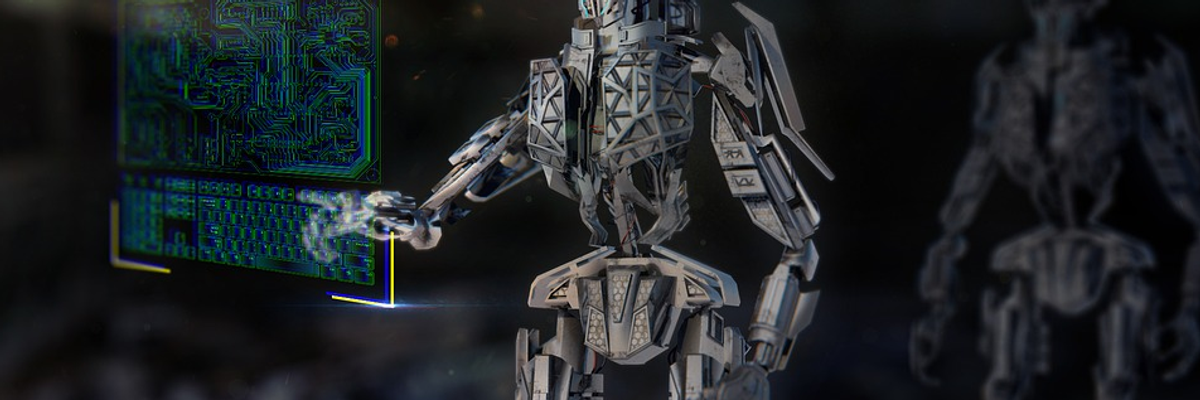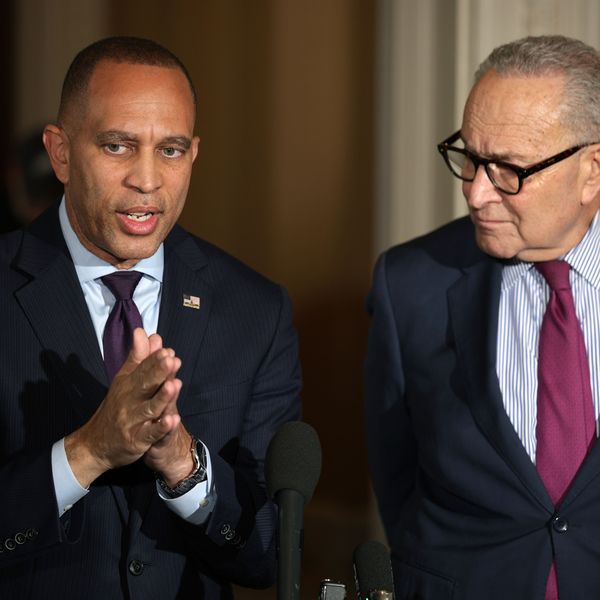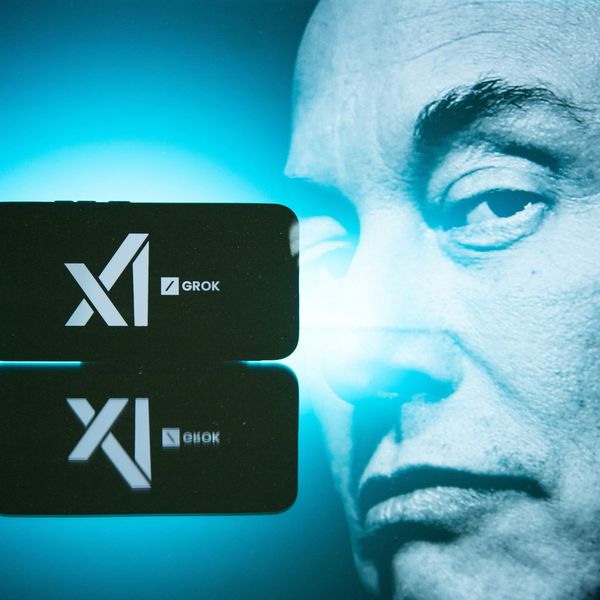
While some have raised concerns about the ability to compete with countries that may develop autonomous robots, a high-ranking General said Tuesday that humans should retain control of decisions in warfare. (Photo: Nicolas Kovarik/Getty)
"Fundamental Existential Threat": Lawmakers Warned of the Risks of Killer Robots
Top U.S. general and inventor Elon Musk join those sounding alarm on artificial intelligence
Urgent warnings about the danger of autonomous weapons systems have come from two very different segments of American life this week. On Tuesday, the second highest-ranking general in the U.S. military testified at a Senate hearing that the use of robots during warfare could endanger human lives--echoing concerns brought up by inventor Elon Musk the previous weekend.
Gen. Paul Selva spoke about automation at his confirmation hearing before the Senate Armed Services Committee, saying that the "ethical rules of war" should be kept in place even as artificial intelligence (AI) and drone technology advances, "lest we unleash on humanity a set of robots that we don't know how to control."
The Defense Department currently mandates that a human must control all actions taken by a drone. But at the hearing, Sen. Gary Peters (D-Mich.) suggested that by enforcing that requirement, which is set to expire this year, the U.S. could fall behind other countries including Russia. Peters cited recent reports of Russia's "ambition to employ AI-directed weapons equipped with a neural network capable of identifying and engaging targets," and to sell those weapons to other countries.
"Our adversaries often do not to consider the same moral and ethical issues that we consider each and every day," Peters said.
Selva firmly stated his view that humans should retain decision-making power in the U.S. military.
"I don't think it's reasonable for us to put robots in charge of whether or not we take a human life," Selva told the committee.
In an open letter in 2015, Tesla and SpaceX CEO Elon Musk joined with scientist Stephen Hawking to warn against competing with other countries to develop AI for military purposes.
"Starting a military AI arms race is a bad idea, and should be prevented by a ban on offensive autonomous weapons beyond meaningful human control," the letter said.
Musk has previously called the development of robots that can make their own decisions, "summoning the demon." Days before Gen. Selva's hearing, Musk spoke at the National Governors Association about the potential for an uncontrollable contingent of robots in the future.
The inventor acknowledged the risks AI poses for American workers, but added that the concerns go beyond employment. "AI is a fundamental existential risk for human civilization, and I don't think people fully appreciate that," Musk said.
He urged governors throughout the U.S. to start thinking seriously now about how to regulate robotics--before AI becomes an issue that's out of humans' control.
"Until people see robots going down the street killing people, they don't know how to react because it seems so ethereal. AI is a rare case where I think we need to be proactive in regulation instead of reactive. Because I think by the time we are reactive in AI regulation, it's too late," warned Musk.
An Urgent Message From Our Co-Founder
Dear Common Dreams reader, The U.S. is on a fast track to authoritarianism like nothing I've ever seen. Meanwhile, corporate news outlets are utterly capitulating to Trump, twisting their coverage to avoid drawing his ire while lining up to stuff cash in his pockets. That's why I believe that Common Dreams is doing the best and most consequential reporting that we've ever done. Our small but mighty team is a progressive reporting powerhouse, covering the news every day that the corporate media never will. Our mission has always been simple: To inform. To inspire. And to ignite change for the common good. Now here's the key piece that I want all our readers to understand: None of this would be possible without your financial support. That's not just some fundraising cliche. It's the absolute and literal truth. We don't accept corporate advertising and never will. We don't have a paywall because we don't think people should be blocked from critical news based on their ability to pay. Everything we do is funded by the donations of readers like you. Will you donate now to help power the nonprofit, independent reporting of Common Dreams? Thank you for being a vital member of our community. Together, we can keep independent journalism alive when it’s needed most. - Craig Brown, Co-founder |
Urgent warnings about the danger of autonomous weapons systems have come from two very different segments of American life this week. On Tuesday, the second highest-ranking general in the U.S. military testified at a Senate hearing that the use of robots during warfare could endanger human lives--echoing concerns brought up by inventor Elon Musk the previous weekend.
Gen. Paul Selva spoke about automation at his confirmation hearing before the Senate Armed Services Committee, saying that the "ethical rules of war" should be kept in place even as artificial intelligence (AI) and drone technology advances, "lest we unleash on humanity a set of robots that we don't know how to control."
The Defense Department currently mandates that a human must control all actions taken by a drone. But at the hearing, Sen. Gary Peters (D-Mich.) suggested that by enforcing that requirement, which is set to expire this year, the U.S. could fall behind other countries including Russia. Peters cited recent reports of Russia's "ambition to employ AI-directed weapons equipped with a neural network capable of identifying and engaging targets," and to sell those weapons to other countries.
"Our adversaries often do not to consider the same moral and ethical issues that we consider each and every day," Peters said.
Selva firmly stated his view that humans should retain decision-making power in the U.S. military.
"I don't think it's reasonable for us to put robots in charge of whether or not we take a human life," Selva told the committee.
In an open letter in 2015, Tesla and SpaceX CEO Elon Musk joined with scientist Stephen Hawking to warn against competing with other countries to develop AI for military purposes.
"Starting a military AI arms race is a bad idea, and should be prevented by a ban on offensive autonomous weapons beyond meaningful human control," the letter said.
Musk has previously called the development of robots that can make their own decisions, "summoning the demon." Days before Gen. Selva's hearing, Musk spoke at the National Governors Association about the potential for an uncontrollable contingent of robots in the future.
The inventor acknowledged the risks AI poses for American workers, but added that the concerns go beyond employment. "AI is a fundamental existential risk for human civilization, and I don't think people fully appreciate that," Musk said.
He urged governors throughout the U.S. to start thinking seriously now about how to regulate robotics--before AI becomes an issue that's out of humans' control.
"Until people see robots going down the street killing people, they don't know how to react because it seems so ethereal. AI is a rare case where I think we need to be proactive in regulation instead of reactive. Because I think by the time we are reactive in AI regulation, it's too late," warned Musk.
Urgent warnings about the danger of autonomous weapons systems have come from two very different segments of American life this week. On Tuesday, the second highest-ranking general in the U.S. military testified at a Senate hearing that the use of robots during warfare could endanger human lives--echoing concerns brought up by inventor Elon Musk the previous weekend.
Gen. Paul Selva spoke about automation at his confirmation hearing before the Senate Armed Services Committee, saying that the "ethical rules of war" should be kept in place even as artificial intelligence (AI) and drone technology advances, "lest we unleash on humanity a set of robots that we don't know how to control."
The Defense Department currently mandates that a human must control all actions taken by a drone. But at the hearing, Sen. Gary Peters (D-Mich.) suggested that by enforcing that requirement, which is set to expire this year, the U.S. could fall behind other countries including Russia. Peters cited recent reports of Russia's "ambition to employ AI-directed weapons equipped with a neural network capable of identifying and engaging targets," and to sell those weapons to other countries.
"Our adversaries often do not to consider the same moral and ethical issues that we consider each and every day," Peters said.
Selva firmly stated his view that humans should retain decision-making power in the U.S. military.
"I don't think it's reasonable for us to put robots in charge of whether or not we take a human life," Selva told the committee.
In an open letter in 2015, Tesla and SpaceX CEO Elon Musk joined with scientist Stephen Hawking to warn against competing with other countries to develop AI for military purposes.
"Starting a military AI arms race is a bad idea, and should be prevented by a ban on offensive autonomous weapons beyond meaningful human control," the letter said.
Musk has previously called the development of robots that can make their own decisions, "summoning the demon." Days before Gen. Selva's hearing, Musk spoke at the National Governors Association about the potential for an uncontrollable contingent of robots in the future.
The inventor acknowledged the risks AI poses for American workers, but added that the concerns go beyond employment. "AI is a fundamental existential risk for human civilization, and I don't think people fully appreciate that," Musk said.
He urged governors throughout the U.S. to start thinking seriously now about how to regulate robotics--before AI becomes an issue that's out of humans' control.
"Until people see robots going down the street killing people, they don't know how to react because it seems so ethereal. AI is a rare case where I think we need to be proactive in regulation instead of reactive. Because I think by the time we are reactive in AI regulation, it's too late," warned Musk.

